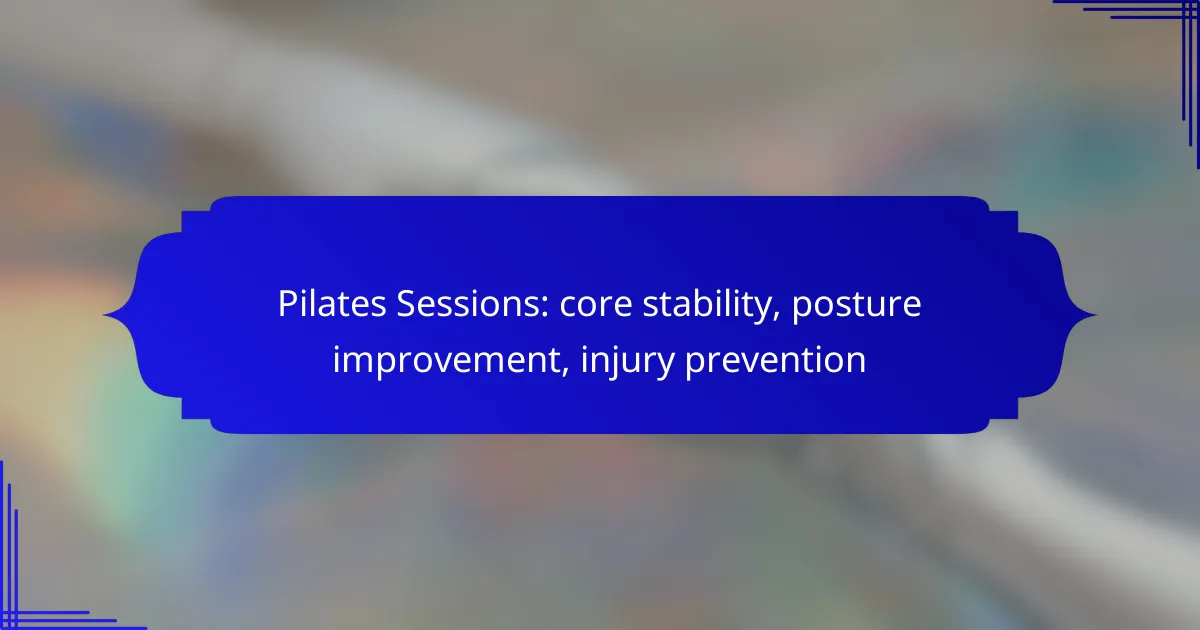Pilates sessions are designed to enhance core stability through controlled movements that engage deep abdominal muscles, promoting strength and balance. These classes are particularly beneficial for improving posture, addressing issues stemming from sedentary lifestyles, and ultimately leading to better body mechanics. Additionally, Pilates plays a crucial role in injury prevention by fostering overall body awareness and alignment, making it an ideal practice for those active in sports or recovering from injuries.

How do Pilates sessions improve core stability in Toronto?
Pilates sessions enhance core stability by focusing on controlled movements that engage the deep abdominal muscles. In Toronto, these classes often incorporate specific techniques that promote strength and balance, essential for overall body stability.
Enhanced muscle engagement
Pilates emphasizes the connection between mind and body, encouraging participants to engage their muscles consciously. This heightened awareness leads to better activation of core muscles, which supports the spine and improves overall stability. Regular practice can help individuals develop a stronger foundation for other physical activities.
Increased balance and coordination
Through various exercises, Pilates improves balance and coordination by challenging the body to stabilize itself in different positions. This is particularly beneficial for activities that require agility and precision, such as sports or dance. Enhanced balance reduces the risk of falls and injuries, especially in older adults.
Strengthened abdominal muscles
Pilates specifically targets the abdominal muscles, including the transverse abdominis, which plays a crucial role in core stability. Strengthening these muscles helps support the spine and pelvis, leading to improved posture and reduced back pain. Consistent practice can lead to noticeable changes in abdominal tone and strength.
Improved pelvic alignment
Proper pelvic alignment is essential for core stability, and Pilates exercises focus on achieving this alignment. By promoting awareness of pelvic positioning, participants learn to maintain a neutral spine, which is vital for preventing injuries. This alignment also contributes to better movement efficiency in daily activities.
Better overall stability
Overall stability is enhanced through the integration of core strength, balance, and alignment achieved in Pilates sessions. This holistic approach not only benefits physical performance but also supports mental focus and body awareness. Individuals in Toronto can experience improved stability in their daily lives, making everyday tasks easier and safer.

What are the benefits of Pilates for posture improvement in Canada?
Pilates offers several benefits for posture improvement, particularly in Canada, where many people experience postural issues due to sedentary lifestyles. By focusing on core stability and alignment, Pilates helps individuals enhance their posture, leading to better overall body mechanics and reduced discomfort.
Alignment correction
Pilates emphasizes proper alignment of the spine and pelvis, which is crucial for maintaining good posture. Through targeted exercises, practitioners learn to identify and correct misalignments, promoting a more balanced body structure. Regular practice can lead to noticeable improvements in how one stands, sits, and moves throughout daily activities.
To achieve alignment correction, consider working with a certified instructor who can provide personalized feedback and adjustments. This guidance ensures that exercises are performed correctly, maximizing their effectiveness in improving posture.
Strengthened back muscles
Strengthening the back muscles is essential for supporting the spine and maintaining good posture. Pilates exercises focus on the muscles that stabilize the back, helping to alleviate strain and prevent injury. A strong back contributes to an upright posture and reduces the risk of developing chronic pain.
Incorporate exercises like the “swimming” or “spine stretch” into your routine to target back strength. Aim for two to three sessions per week to build muscle endurance and support postural improvements over time.
Increased body awareness
Practicing Pilates enhances body awareness, allowing individuals to recognize their posture and movement patterns. This heightened awareness enables better control over body mechanics, leading to more conscious adjustments in daily life. As a result, individuals become more mindful of their posture while sitting, standing, or engaging in physical activities.
To boost body awareness, focus on slow, controlled movements during Pilates sessions. Pay attention to how your body feels in different positions, which can help reinforce good posture habits outside of class.
Reduced muscle tension
Pilates helps to reduce muscle tension, particularly in areas commonly affected by poor posture, such as the neck and shoulders. By promoting relaxation and stretching, Pilates alleviates tightness and discomfort, allowing for a more relaxed posture. This reduction in tension can lead to improved mobility and overall well-being.
Incorporate stretching exercises, such as the “cat-cow” or “child’s pose,” into your routine to help release muscle tension. Aim to practice these stretches regularly, especially after long periods of sitting or standing, to maintain a relaxed posture throughout the day.

How can Pilates sessions help with injury prevention in Ontario?
Pilates sessions can significantly aid in injury prevention by enhancing core stability, improving posture, and promoting overall body awareness. In Ontario, these benefits are particularly relevant for individuals engaged in physical activities or those recovering from injuries.
Improved flexibility
Increased flexibility is a key benefit of Pilates that contributes to injury prevention. By regularly practicing Pilates, individuals can enhance their range of motion, which helps reduce the risk of strains and sprains during physical activities. Stretching major muscle groups through controlled movements can lead to better overall flexibility.
To maximize flexibility gains, focus on consistent practice, ideally 2-3 times per week, and incorporate various stretches targeting different muscle groups. This approach can help maintain and improve flexibility over time.
Strengthened supporting muscles
Pilates emphasizes the development of supporting muscles, particularly those surrounding the core, hips, and back. Strengthening these areas helps stabilize the body during movement, reducing the likelihood of injuries. Strong supporting muscles provide a solid foundation for daily activities and sports.
Incorporating exercises like the Pilates hundred or leg circles can effectively target these supporting muscles. Aim for a balanced routine that includes both strength and flexibility exercises to ensure comprehensive muscle development.
Enhanced joint stability
Joint stability is crucial for injury prevention, and Pilates promotes this through controlled movements that engage stabilizing muscles. By focusing on alignment and proper form, practitioners can improve their joint stability, which is essential for maintaining balance and preventing falls.
Consider including exercises that require balance, such as single-leg lifts or side-lying leg raises, to enhance joint stability. Regular practice can lead to better coordination and a lower risk of joint-related injuries.
Better movement patterns
Pilates encourages awareness of body mechanics, leading to improved movement patterns. By learning to move efficiently and with proper alignment, individuals can avoid compensatory movements that often lead to injuries. This awareness translates into better performance in sports and daily activities.
To develop better movement patterns, focus on exercises that emphasize core engagement and proper posture. Practicing these principles consistently can help reinforce healthy movement habits and reduce the risk of injury over time.

What should I consider when choosing a Pilates studio in Canada?
When selecting a Pilates studio in Canada, prioritize factors like instructor qualifications, class size, equipment availability, and location convenience. These elements significantly impact your experience and the effectiveness of your sessions.
Instructor qualifications
Look for instructors who are certified through recognized organizations, such as the Pilates Method Alliance or Stott Pilates. Qualified instructors typically have extensive training in anatomy and movement, which enhances their ability to guide you safely.
Consider the instructor’s experience level as well. Those with years of teaching experience may offer deeper insights into modifications and advanced techniques, ensuring a tailored approach to your needs.
Class size and environment
Smaller class sizes often allow for more personalized attention, which can be crucial for beginners or those with specific goals. Aim for classes with no more than 10 participants to ensure you receive adequate guidance.
Additionally, assess the studio’s environment. A clean, well-lit space with a welcoming atmosphere can enhance your motivation and comfort during sessions.
Equipment availability
Check if the studio offers a variety of equipment, such as reformers, stability balls, and resistance bands. Access to diverse tools can enrich your practice and help target different muscle groups effectively.
Some studios may also provide specialized equipment for rehabilitation purposes. If injury prevention or recovery is a priority for you, ensure the studio has the necessary resources to support your goals.
Location convenience
Choose a Pilates studio that is easily accessible from your home or workplace. A convenient location can help you maintain a consistent practice, which is essential for achieving core stability and improving posture.
Consider transportation options as well. If you rely on public transit, check the availability of nearby bus or subway stations to ensure your commute is manageable.

What are the different types of Pilates sessions available in Toronto?
In Toronto, various types of Pilates sessions cater to different needs, including group classes, private sessions, and specialized workshops. Each format focuses on core stability, posture improvement, and injury prevention, allowing participants to choose what best suits their fitness goals.
Group Pilates Classes
Group Pilates classes are popular for their social aspect and affordability. Typically held in studios, these sessions accommodate multiple participants and often focus on foundational techniques and core exercises. Classes can vary in intensity, from beginner to advanced levels, allowing individuals to progress at their own pace.
When selecting a group class, consider the instructor’s qualifications and the class size, as smaller groups often provide more personalized attention. Many studios in Toronto offer trial classes, which can help you find the right fit before committing.
Private Pilates Sessions
Private Pilates sessions offer tailored instruction to meet individual needs. These one-on-one sessions allow for personalized feedback and adjustments, making them ideal for those recovering from injuries or looking to refine their technique. In Toronto, private sessions can be booked at various studios or with independent instructors.
While more expensive than group classes, private sessions can accelerate progress and enhance understanding of Pilates principles. Look for certified instructors with experience in injury rehabilitation to ensure a safe and effective experience.
Specialized Workshops
Specialized workshops focus on specific aspects of Pilates, such as advanced techniques, equipment usage, or targeted areas like flexibility and strength. These workshops are typically offered on weekends or as part of a series, providing an opportunity to deepen your practice.
Participating in workshops can enhance your skills and knowledge, making them a valuable addition to regular classes. Check local studios for upcoming workshops, as they often feature guest instructors with unique expertise.
